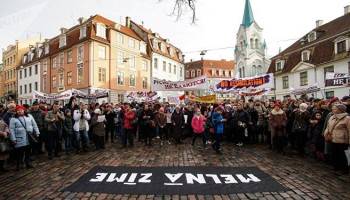Pro-Russian Demonstrations in Riga: The ‘Spanish Trace’ and Potential Repercussions
The Latvian Russian Union (LKS) and Headquarters for the Protection of Russian Schools (HPRS) organized a demonstration in the capital city of Riga, on September 15.
Undoubtedly, this international attention to the issue was profoundly boosted by the participation of Spanish MEP Ana Miranda (from the Galician Nationalist Bloc party), who came to Riga “to support Latvia’s severely discriminated-against national minorities”. In the European Parliament, Miranda belongs to the European Free Alliance (EFA) political coalition, which stands on the principles of independence movements, socialism, Euroscepticism, and left-wing nationalism.
It is important to note that ties between pro-Russian activists and Spanish separatists have a long history. For instance, while in the EP, Tatyana Zhdanok would visit Spain on numerous occasions to foster ties and expand cooperation.
[ > The Jamestown Foundation — October 12, 2018 ]

